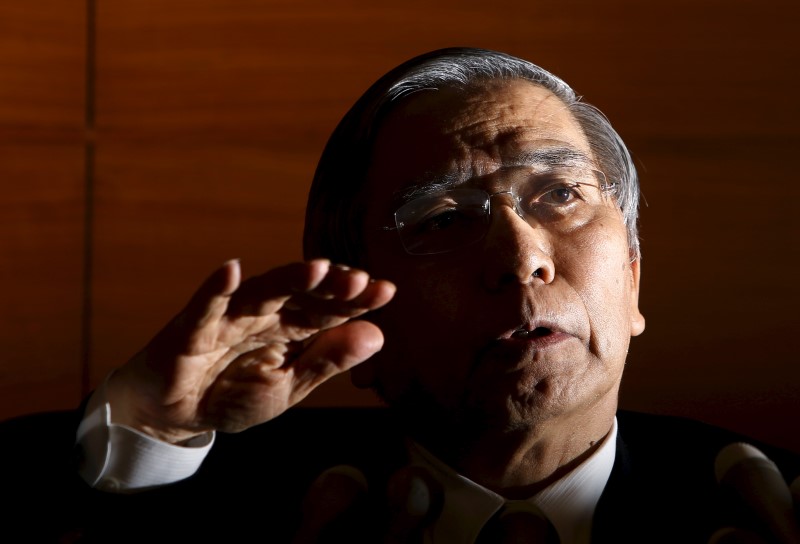By Patrick Graham
LONDON (Reuters) - If there were any suggestion that the fears that have gripped stock markets since the start of 2016 were the isolated stuff of paranoid financial investors, that evaporated with Friday's shocking meeting of the Bank of Japan.
Before the European Central Bank's own January meeting a week ago, the assumption of many watchers was that the world's big central banks would try their best to reestablish calm by doing little to tweak their current stances.
Instead, first the ECB's Mario Draghi and now the BoJ's Haruhiko Kuroda, stunning economists by cutting interest rates into negative territory on Friday, have sent the clearest of signals that the global economy is again nearing the brink.
Three of the big U.S. banks - Morgan Stanley (N:MS), Bank of America (N:BAC) and Citi - all warned this week that the risks of a global recession before the end of 2016 were rising.
"We're only one month into the year and two of the major central banks have already surprised markets," said Nick Gartside from J.P. Morgan's Asset Management arm.
"Both banks are reacting to economic reality. Growth and inflation are meaningfully undershooting targets and more stimulus is needed to get both higher."
This month trails only marginally behind the post-crisis mess of 2009 as the worst start to a year for U.S. and global stocks in decades; hedge funds are beginning to bet on a large currency devaluation by China; and, even with a recovery this week, oil has reached $30 a barrel.
Yet that all comes just weeks after the U.S. Federal Reserve felt bullish enough about its domestic economy to raise interest rates for the first time in almost a decade.
A raft of economic numbers in the first week of February, culminating in next Friday's U.S. jobs numbers, should put more skin on those bones, as may the Bank of England's quarterly inflation report on Thursday.
"Our impression is that, rather than dismissing recent developments as transitory, authorities seem rattled and uncertain," economists from France's BNP Paribas (PA:BNPP) said in a weekly briefing note.
CHINESE NEW YEAR
The week begins with a bang with PMI sentiment numbers out of China, a major leading indicator and the first one of substance from the world's second biggest economy in almost two weeks.
The turmoil on China's stock markets at the turn of the year was one trigger for the broader global sell-off and Shanghai shares have continued to slide in the past week in contrast to greater stability elsewhere.
Beijing will look to the Lunar New Year at the end of the week for some breathing space in its efforts to head off more pressure on the yuan and with it the immediate threat of a round of corporate debt defaults that economists rate at the top of a pile of global financial risks.
A series of official communiques warned speculators off the yuan this week, although pricing suggests that hedge funds - whether or not they include Hungarian financier George Soros - have only added to bets it will move.
Beijing has held the yuan steady against the dollar for two weeks and taken a series of steps to stop capital from leaving the country. But it still faces an essential conundrum of how to deflate a huge bubble of excess borrowing and money supply that consumers and companies want to send abroad.
"If the Chinese felt this situation was out of control, they would do more," said Mark Farrington, portfolio manager at hedge fund Macro Currency Group in London.
CRUDELY
The other big floating factor is oil.
Oil prices have been helped by some signs that OPEC lynchpin Saudi Arabia and other mainstays of that group of producing countries may be ready to talk more on managing output.
But Russian Deputy Prime Minister Arkady Dvorkovich, sounded a more measured tone at a news briefing in Moscow on Friday.
Barclays and other market analysts cast doubt on the chances of a swift rapprochement between producers, whose excess of output over supply has driven the value of some U.S. produced crude grades to near zero.
"There is a vast difference between a meeting to exchange views on the state of the markets and a meeting to agree on a cut," Barclays (L:BARC) Head of Energy Commodities Research Michael Cohen wrote on Friday.

"We see this as nothing more than an attempt to shift market sentiment, and we do not expect that it will change the physical market imbalance."